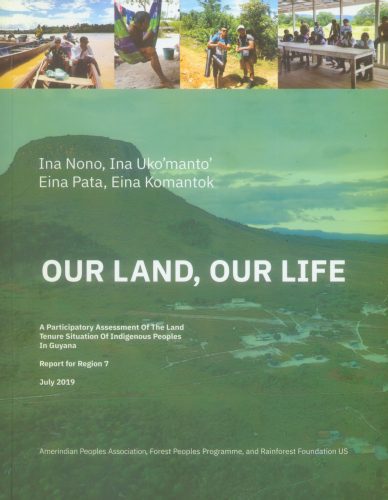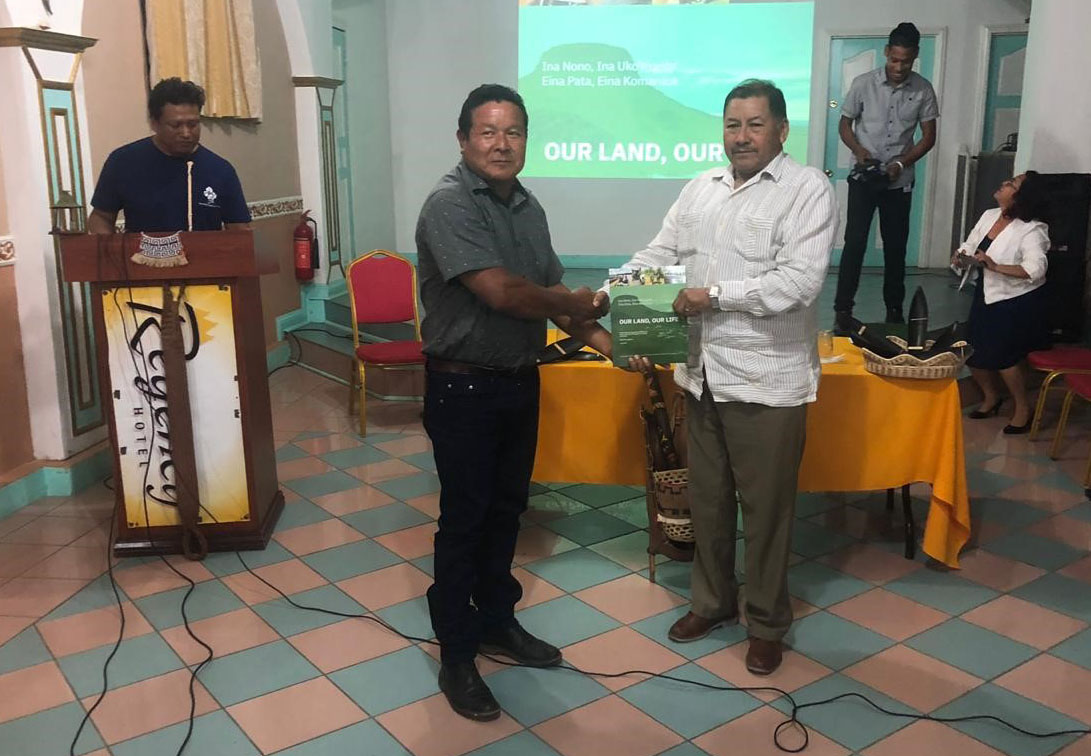All of the Amerindian communities visited in Region Seven as part of a land tenure assessment have reported a land and resource conflict with external parties on their titled and customary lands, according to the findings of a study undertaken by the Amerindian Peoples Association (APA).
The report, which was launched by the Association yesterday afternoon at the Regency Suites Hotel in Georgetown, also found that 16 of 20 communities visited reported that commercial mining and logging were harming their environment and the livelihoods of residents there.
The report represents 16 months of research on the land tenure situation of indigenous communities in the region, as part of a series that previously examined the situation in regions One, Two and Eight.
 The APA carried out the study in collaboration with community members at the end of 2017 and throughout last year. Additional literary research was undertaken at the start of this year during the compilation of the report.
The APA carried out the study in collaboration with community members at the end of 2017 and throughout last year. Additional literary research was undertaken at the start of this year during the compilation of the report.
Of the 20 communities covered, 15 are titled, while the remaining five possess no legal documents to their land.
The team also visited two satellite villages located within the titled boundaries of other villages; a few families who are living within their traditional lands but do not have formal governance bodies; and two communities located in close proximity and similarly situated to other Region Seven villages but which are not formally located in other regions.
Noting the land and resource conflicts experienced by all of the communities, the report states that most of the issues relate to mining and logging, with one instance of conflict with the state authorities, including the army and police.
The report highlights that 11 of the 15 titled villages have problems with mining activities or movement of unauthorised miners on their titled land, at that least two villages reported explicit incidences of bullying and violence. It adds that 16 communities reported that commercial mining and logging are harming the environment and livelihoods that they depend on, and that the main concerns of residents related to resources within titled areas becoming scarce due to population growth; titled areas being too small and lacking suitable farmland; mining causing pollution, deforestation and scarcity of game animals and fish; and changing weather patterns, especially heavier rainfall, damaging crops and causing the failure of some traditional fishing methods.
As it relates to demarcation, titling and the extension process, the report points out that six out of the 15 titled villages have been demarcated; and one of those demarcated villages has reported flaws in its title demarcation, with the demarcation not following the title description.
Additionally, of the four extension applications filed by the villages visited, none has yet been granted. Also, six of the villages are seeking collective title to a larger Akawaio and Arecuna territory through a court case against the government that dates back to 1998. “The current system of titling communities individually does not cater for the fact that much of the customary land of communities has traditionally been shared between neighbouring villages within a collectively-held territory,” the report notes, while adding that many of the communities are dissatisfied with the way individual village titles have fragmented their collective territory.
Communities surveyed included Chinoweing, Jawalla, Kako, Kambaru/ Omanaik, Paruima, Phillipai, Waramadong, Kamarang/Warawata, Wax Creek, Quebanang, Emoi-keng, Isseneru, Kangaruma, Tassarene, Batavia, Karau, River View, Arau, Kaikan, Kurutuku, and Onopik.
Dissatisfied
Despite 15 of the 20 communities visited being in possession of land titles, the report states that all of the titled villages were dissatisfied with their titles. Two of the communities, it adds, have been told by the Attorney General that they have legal titles, but they have not yet received valid title documents.
It also notes that the land tenure security of six of the titled villages are limited by a ‘save and except’ clause in their absolute grant and/or their certificate of title.
“These ‘save and except’ clauses exclude third-party private property or land lease interests from titled area if they predate the title agreement. This means that mining concessions, logging concessions, or leases granted on the land before title was issued are allowed to remain after title is issued. For at least two of these villages, the ‘save and except clause further limits the villages’ ability to control the right of passage through village lands,” the report says.
It adds that at least 11 of the 15 titled villages reported that they were not consulted or asked for their free, prior and informed consent (FPIC) to the area granted as title; and the titles of at least 14 of the 15 titled villages fail to cover the full customary areas traditionally occupied and used by the villages.
Residents in 12 of the 15 titled villages also reported that they depend on land outside of their titled area for gathering of medicinal plants, materials for crafting and building, and 10 of the 15 villages reported that they have homesteads and small settlements outside of their title boundaries.
Ten of the 15 titled villages also indicated that they have important cultural and spiritual sites located outside of their title boundaries.
As in the case of the previous reports on regions One, Two and Eight, it was found that the main causes of the situation include flawed laws, including the 2006 Amerindian Act; problems with the way land is allocated to mining and logging interests, including the issuance of rights in customary lands under claim; lack of effective and meaningful participation in decision-making; and lack of an effective means of redress.
Legally recognise
According to the report, the communities are calling on the government to legally recognise and provide secure title to all lands in the Akawaio, Arecuna, Carib, Arawak, Patamona and Warrau people. “These areas include lands upon which their fore-parents depended and which people continue to occupy and use for farming, hunting, fishing and gathering today, as well as spiritual sites, cultural heritage sites, and other areas of historical importance,” the report explains.
It highlights that there is a need for the revision of existing laws, policies and governmental practices to fully respect indigenous peoples’ rights to their lands, territories, and resources, as well as their right to free, prior and informed consent, consistent with Guyana’s obligations under international law and international standards.
The report also proposes the granting of indigenous peoples titles to the full extent of their traditional lands and allowing for titles to larger territories to be held collectively by multiple villages through a district council and to revise the process for processing title and extension applications so they can be approved in a timely and efficient manner.
The proposals also state that the government should refrain from granting mining and logging concessions on communities’ traditional and titled lands without free, prior and informed consent and to return lands taken to build government compounds back to the communities, as well as removing third party encumbrances on the land returned to villages when granting new titles and extensions, and removing any ‘save and except’ clauses.
The report also proposes the investigation of reports of rights abuses committed by miners, loggers, police and soldiers and to discipline the perpetrators and to also provide communities with regularly updated information regarding the status of concessions, airstrips and other possible encumbrances on their lands.
It adds that there should be a systematic study of the pollution and destruction of forests caused by mining in the Region and for there to be a centralised and synchronised mapping of databases across all government agencies so the maps can display the correct information regarding village titles.
At the end of the launch, Minister of Amerindian Peoples’ Affairs Sydney Allicock was presented with a copy of the report.





